Our Newsletter

Current Issue
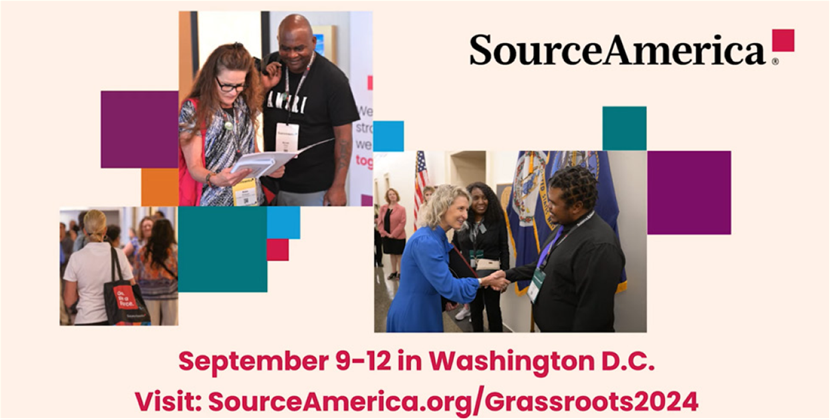
GRASSROOTS CONFERENCE FOCUS: DISABILITY EMPLOYMENT
BY APRIL WHITE
Mar 2025 – Vol. 2, No. 1
SourceAmerica’s most recent 2024 Grassroots Advocacy Conference, held this past September, brought disability employment issues to Capitol Hill as more than 60 self-advocates, family members, and nonprofit leaders met with lawmakers to share personal stories and push for inclusive hiring policies. Among the attendees from PCCS were Lawrence Silva, Chief Operating Officer, and Shawn Jones, Mailroom Supervisor, who joined colleagues in highlighting how federal programs and policies affect job opportunities for people with disabilities on the West Coast. Jones, a keynote speaker, shared his personal journey as an AbilityOne employee, illustrating how hard work and dedication led to upward mobility through a series of merit-based promotions.
Over several days in Washington, participants met with members of Congress and their staff, providing first-hand examples of successes and barriers in the workplace. With the employment rate among Americans with disabilities at only about 22.5%, the conference offered a critical platform for raising awareness of inclusive employment needs. “We are thrilled to bring so many self-advocates together to help shape public policy that impacts employment opportunities,” said Richard Belden, SourceAmerica’s president and CEO, underscoring the importance of the event.
SourceAmerica, established in 1974, is one of two national nonprofits authorized to administer the federal AbilityOne Program, which connects government agencies with a network of more than 420 community-based nonprofits employing people with significant disabilities. Through these contracts, nearly 60,000 people with disabilities are employed nationwide—a reflection of SourceAmerica’s mission to increase economic and social inclusion by creating meaningful job opportunities for an underutilized workforce.
PCCS, a trusted SourceAmerica affiliate based in California, exemplifies this mission at the local level. The nonprofit helps people with disabilities gain training and find meaningful employment, and it reports that about 80% of its clients have secured jobs through AbilityOne contracts—a success attributed to SourceAmerica’s support and advocacy. SourceAmerica not only connects agencies like PCCS to federal contract work, but also provides training grants and guidance that build capacity for these organizations.
Silva and Jones’ attendance at the Washington D.C. conference underscored the partnership between PCCS and SourceAmerica. They and other representatives used the opportunity to brief legislators on their programs and community impact, emphasizing the value of inclusive hiring initiatives. “The conference provides our organization with the opportunity to meet with our local legislators and provide details on our programs and services,” Silva said in a message prior to the event. He added that during their advocacy meetings, they planned to “champion policy and employment opportunities for our local disabled community”—a goal very much in line with the conference’s spirit.
For advocates like Silva and Jones, sharing personal stories with policymakers is key to showing how federal decisions shape opportunities on the ground. Organizers say the Grassroots Advocacy Conference is not just an annual meetup, but part of a sustained effort to ensure that people with disabilities have a voice in policies that affect their employment and a fair shot at meaningful work in their communities. ■
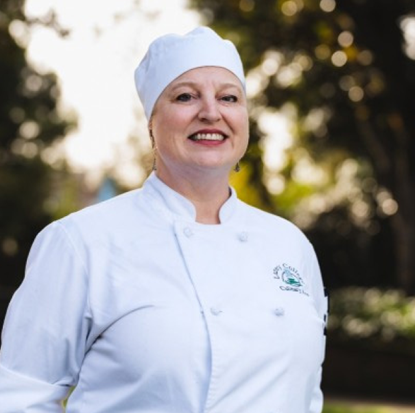
PCCS CLIENT SUCCESS JOURNEY: SERENA OLSEN
BY APRIL WHITE
Mar 2025 – Vol. 2, No. 1
When Serena Olsen earned her graduate degree in 2006, she envisioned a career in international development—building communities, shaping policy, and working abroad. She did, for a time, carve out a path in the nonprofit world. She worked with organizations that served the blind community—a community she was part of and deeply familiar with. But discrimination and ableism were persistent obstacles, limiting her opportunities beyond that niche.
Still, she pushed forward. In 2014, she joined the Peace Corps and served in the Kyrgyz Republic. This was an achievement that required navigating a variety of institutional hurdles as a candidate with a disability. She connected with a local effort to establish a training center for blind adults, contributing her experience and support to help bring the vision to life. When she returned to the Bay Area, she took a position with Lighthouse for the Blind in San Francisco, coordinating social and recreational programming. For five years, she brought people together through outings, arts, and community events offering connection and joy. “It was exciting,” she recalled. “I wasn’t doing skills training or Braille; I was taking people to the theater, building community.”
Then the pandemic hit, and with it came deeply personal challenges that forced her to step away from work entirely. What she thought would be a temporary disruption stretched into four years. “I just assumed I’d bounce back into the workforce when I was ready,” Serena said. “But it wasn’t that simple.” Her confidence eroded. Her job search stalled. Over time, she realized that trying to do it alone wasn’t working.
“I needed external accountability,” she said. “Someone to hold me to the process, to help me rebuild the habits I’d lost.” Through her Department of Rehabilitation counselor, she was referred to Pacific Coast Community Services, and that’s when things shifted and a new journey unfolded.
Collaborating with her PCCS Job Developer, Serena began to reframe her approach. They overhauled her resume from reverse chronological to one that highlighted transferable skills. “It was overwhelming at first,” she said, “but once I saw her method, I thought—this is brilliant.” They also revamped her cover letter technique into one that is particularly effective at generating a response. The structure gave Serena a way back in. More importantly, it helped her believe in her value once again.
Attending the Job Club twice a week helped solidify her progress. The sessions, facilitated by Otto DeLeon, offered both encouragement and accountability. “Otto was a sweetheart,” she said. “Kind, compassionate, and supportive.” And showing up regularly meant she had to report on her efforts, which kept her moving, even when momentum was hard to find.
When Serena shared her interest in food justice and urban agriculture, PCCS listened. She became the first program participant placed at the UC Gill Tract Community Farm in Albany. This farm is a site deeply rooted in community empowerment, land rematriation, and feeding the community. Serena split her time between administrative work and hands-on fieldwork, growing seedlings, harvesting vegetables, and tending the pollinator patch. “It was a magical summer,” she said. “That farm reminded me of what I had to offer…I don’t know that I had ever felt so valued as I did there.”
Today, Serena is once again fully employed. “Not having a steady paycheck really chips away at your confidence,” she said. “I have that back, and it’s extremely empowering.” While no one knows what the future may hold, Serena is certain that she now has the tools, and the confidence, to secure a rewarding career. “PCCS helped me feel empowered again,” she said. “I don’t have to deplete my savings or doubt my worth. I can stand on my own two feet. That means everything.” ■

ARTIFICIAL INTELLIGENCE (AI)
AND THE EVOLVING JOB MARKET
BY OTTO DELEON
Mar 2025 – Vol. 2, No. 1
Artificial intelligence (AI) is reshaping nearly every aspect of the job market, from resume screening to interview preparation. For job seeking individuals with disabilities, veterans transitioning to civilian employment, and those re-entering the workforce after an extended absence, AI-powered tools provide tailored support, breaking down barriers that once made job searches more challenging and time-consuming.
With rapid implementation, AI has become an integral part of modern job hunting. Whether welcomed or resisted, the job search process has become increasingly digital. Employers now rely on applicant tracking systems (ATS) to filter resumes, AI-driven chatbots to answer candidate questions, and machine learning algorithms to match applicants with roles that align with their skills and experience.
For job seekers facing unique challenges—such as employment gaps, the need for accommodations, or translating military experience into civilian job qualifications—AI offers solutions that streamline the process and improve accessibility.
A 2023 McKinsey & Co. report found that AI-powered hiring platforms can reduce bias in recruitment by as much as 30% when properly implemented. This is particularly beneficial for individuals with disabilities and veterans, who may face unconscious bias in traditional hiring settings.
AI-driven resume optimization tools have also proven valuable. Many job seekers are unaware that 75% of resumes never reach a human recruiter because they are filtered out by ATS software, according to a 2022 study by Jobscan. AI-powered resume builders help candidates tailor their applications to meet ATS criteria, increasing their chances of advancing in the daunting and competitive hiring process.
For individuals with disabilities, these tools can also highlight transferable skills and suggest alternative phrasing to emphasize strengths without disclosing private disability-related information—unless and when the applicant chooses to do so.
Veterans transitioning into civilian careers can benefit from AI-powered military-to-civilian job translators, such as those offered by Hire Heroes USA and O*NET OnLine, which convert military occupational specialties (MOS) into relevant civilian job descriptions.
AI also enhances interview preparation. Platforms such as Big Interview and MyInterview provide virtual coaching by analyzing a candidate’s responses, body language, and speech patterns in mock interviews. These platforms offer real-time feedback on tone, eye contact, and clarity—helping job seekers refine their presentation before meeting with a recruiter.
For individuals with disabilities, these tools can be especially useful for practicing disclosure conversations around accommodations and gaining confidence in discussing work history. Often, rehearsing responses and identifying key talking points in advance builds muscle memory, reducing anxiety and stress when the actual interview takes place.
Job seekers re-entering the workforce after extended absences—such as caregivers or formerly incarcerated individuals—can use AI coaching to frame employment gaps effectively and build confidence. Following the pandemic, work gaps have become less of a hiring deterrent, provided job seekers can articulate their experiences and any personal or professional development undertaking during that time.
Traditional job boards can be overwhelming, but AI-driven job matching services like LinkedIn’s AI-powered job recommendations and Pymetrics analyze user skills, preferences, and experience to connect job seekers with relevant opportunities. For individuals who struggle with in-person networking, AI powers platforms like Handshake and Mentra, which help neurodivergent job seekers and those with disabilities find inclusive employers and job opportunities.
Despite its benefits, AI-driven hiring tools are not without challenges. A 2021 Brookings Institution study found that AI algorithms can perpetuate societal biases if not properly trained on diverse datasets.
For example, individuals with non-linear career paths—such as those re-entering the workforce—may find that AI ranking systems prioritize continuous employment over other valuable experiences, potentially disadvantaging them.
Additionally, while AI can improve accessibility, it can also create new barriers. Voice recognition software may struggle with speech impairments, and automated video interview tools may unfairly score neurodivergent candidates based on nontraditional body language.
To maximize AI’s benefits while avoiding potential pitfalls, job seekers should:
-
- Use AI resume scanners to ensure their job applications are customized to the job description and are optimized as ATS-friendly.
- Practice with AI interview coaching tools but seek authentic human feedback as well.
- Leverage AI-driven job matching platforms while maintaining traditional outreach efforts.
- Advocate for accessible AI hiring practices by providing honest feedback to employers about any barriers encountered.
AI is transforming the job search landscape, offering powerful tools for individuals with disabilities, veterans, and those re-entering the workforce. While it can help bridge employment gaps and improve accessibility, job seekers must remain proactive in navigating AI-powered systems to ensure they take full advantage of available opportunities.
As AI continues to evolve, its potential to create a more inclusive hiring process will depend on both technological advancements and the advocacy of job seekers pushing for fair, equitable employment practices.
Job searching is about effective storytelling. The more authentic, honest and confident you are in conveying what you bring to the workplace—enhanced with AI-powered resources—the stronger your chances of securing meaningful employment where you can contribute, grow, and succeed.
For those seeking AI-powered job search tools, resources like JAN (Job Accommodation Network), LinkedIn Learning, and Hire Heroes USA offer free training and support. ■

ADA TITLE II: EQUAL ACCESS TO PUBLIC SERVICES
BY OTTO DELEON
Mar 2025 – Vol. 2, No. 1
In 2024, we launched our series on the Americans with Disabilities Act (ADA), kicking things off with an introductory overview. Then we followed with a spotlight on Title I, focusing on workplace rights and responsibilities. Continuing this series, we now turn to Title II—an essential provision for individuals with disabilities actively seeking employment.
Access to public services can be a determining factor in a person’s ability to secure meaningful employment. From navigating public transportation to enrolling in government-funded job training programs, individuals with disabilities must be able to engage with these services without barriers. Title II of the ADA mandates that state and local government agencies provide equal access to their programs, services, and activities for people with disabilities.
Many are familiar with the ADA’s role in protecting workplace rights under Title I, but fewer recognize the impact of Title II on the job search process. Whether it’s commuting to an interview, applying for a government job, or accessing workforce development resources, Title II ensures that individuals with disabilities have the same opportunities to benefit from these critical services.
So, what does Title II cover? It prohibits state and local governments from discriminating against individuals with disabilities in various profound ways. This includes:
-
- Public transportation: Ensuring that buses, trains, and paratransit services are accessible, allowing individuals to travel to work, job interviews, and employment-related appointments.
- State and local government offices: Guaranteeing equal access to employment assistance programs, public libraries, DMV offices, and vocational rehabilitation services.
- Digital accessibility: Requiring that websites and online portals for job applications, unemployment benefits, and workforce training programs accommodate assistive technologies like screen readers.
- Law enforcement and emergency services: Mandating that individuals with disabilities can access emergency services, including 911 call centers, and interact with law enforcement without barriers.
How does Title II support job seekers? It plays a crucial role for individuals who are actively engaged in finding meaningful and productive work. For those re-entering the workforce, Title II helps remove barriers to employment. Some of the most common ways it supports active job seekers include:
-
- Access to vocational rehabilitation and job training: State-funded employment programs must provide reasonable accommodations such as American Sign Language (ASL) interpreters, accessible training materials, and alternative communication methods—to help assess participant competencies and skills.
- Navigating public transportation challenges: If job seekers rely on public transit, Title II ensures that transit systems—including schedules and service announcements—are accessible. If fixed-route systems are not an option, paratransit services must be available to eligible riders.
- Applying for government jobs: Title II ensures that hiring processes for state and local government jobs are inclusive. This means that online applications, interview locations, and onboarding materials must be accessible.
As a job seeker, understanding your rights is critical. If a government agency fails to provide equal access to a public service due to a disability, individuals have the right to file a complaint under Title II, particularly when a public entity:
-
- Refuses to provide reasonable accommodations
- Fails to meet public transit requirements or
- Creates taxing barriers in workforce training or hiring programs for individuals with disabilities.
If you believe your rights have been violated, complaints can be filed with the U.S. Department of Justice, which enforces compliance with Title II.
The job search process is challenging enough without additional accessibility barriers. Title II of the ADA ensures that individuals with disabilities, veterans, and those re-entering the workforce have equal access to public services that support employment success. Knowing these rights empowers job seekers to advocate for necessary and reasonable accommodations and hold government agencies accountable.
For assistance or to learn more about Title II, visit resources like the Job Accommodation Network (JAN) and the ADA National Network. In today’s modern society, ensuring accessibility in public spaces and services is just as critical as workplace protections—because true inclusion extends beyond the job itself.
For more detailed information and resources regarding Title II protections, visit the ADA website (https://www.ada.gov/law-and-regs/regulations/title-ii-2010-regulations/). ■
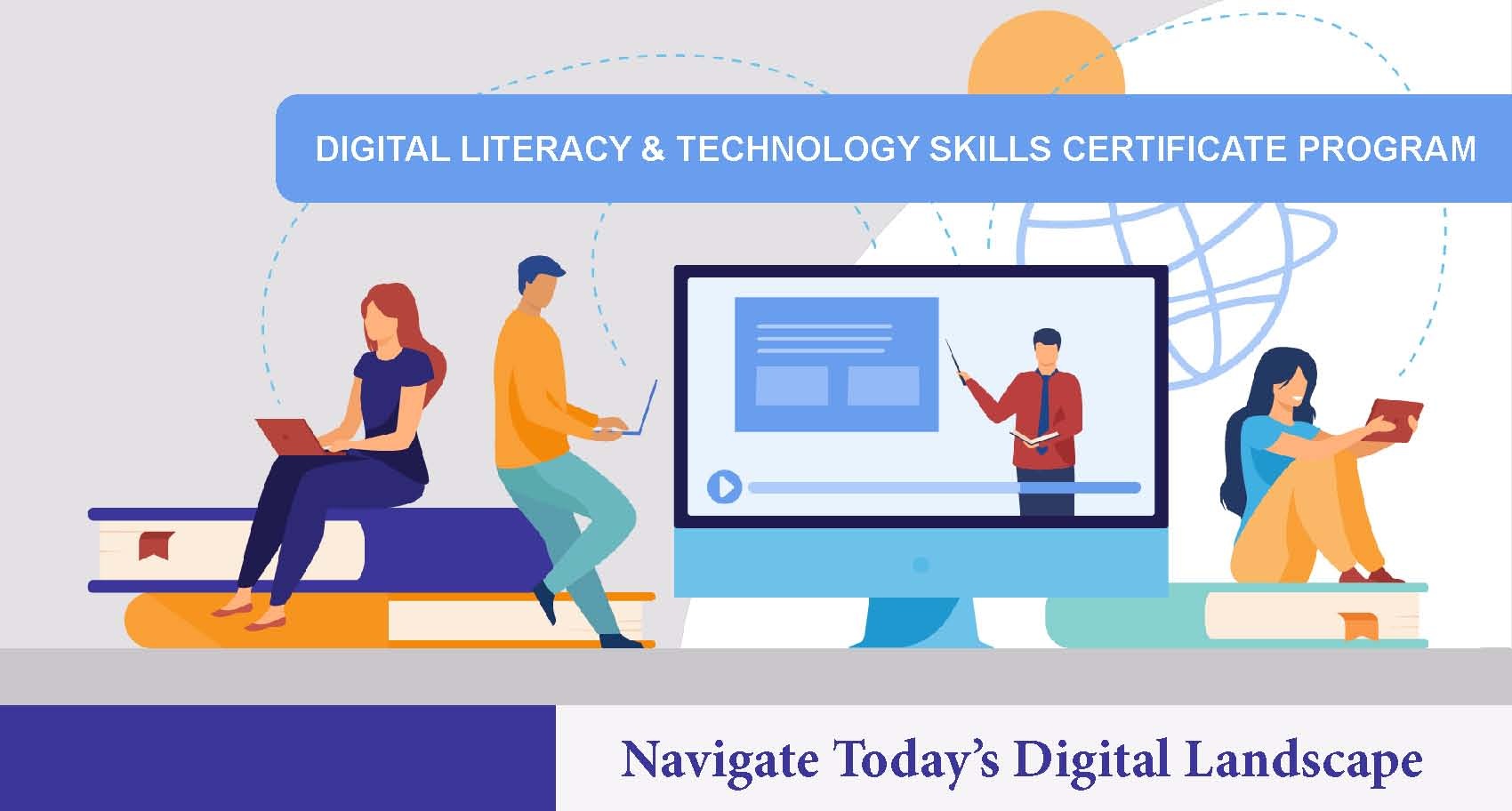
BUILDING DIGITAL SKILLS FOR THE FUTURE
BY APRIL WHITE
Mar 2025 – Vol. 2, No. 1
Pacific Coast Community Services makes it easier for motivated job seekers to gain the digital skills they need to succeed in today’s workplaces. The Digital Literacy & Technology Skills certificate program is designed for people who may not be comfortable with computers or need to refresh their skills after time away from the workforce. Veterans, people with disabilities, justice-involved individuals, and seniors reentering the workforce are among those who can benefit.
The course covers computer basics—everything from using a keyboard and mouse to navigating email, spreadsheets, and presentations. It also introduces students to different operating systems, helping them understand the differences between Windows and Mac. Some participants come in with a bit of experience, while others are starting from scratch. “We try to give an all-around introduction to [computers],” said course instructor, Felipe Sosa. “Not everyone has the same comfort level in interacting with electronic technology.”
While the course is primarily offered online, in-person instruction is available for those who prefer it. Most students select online study, allowing them to learn at their own pace with personalized support. Weekly check-ins and scheduled office hours with an instructor help ensure students understand the material, can raise questions, and gain confidence with their new skills.
This course was designed with the understanding that building familiarity with current office technologies can open all kinds of career opportunities. Sosa described the course as a “bridge” between job seekers and where they would like to be in their lives—whether that means seeking employment directly or pursuing further study. As Sosa explained, “The best thing about this course is that it is […] a stepping stone for a lot of people—and a great example of well-applied value.”
Digital literacy is a must-have skill in almost every job these days. Whether someone needs to send emails, download files, create spreadsheets or documents, these are tasks that come up in nearly every industry. Many learners taking this course reenter the workforce after an extended period and find that the technology they knew has changed drastically. The ability to tailor instruction to individual needs makes this course especially valuable for those reentering the workforce or learning new tools for the first time. The goal of this course is to help students become familiar with the most frequently used and current office technologies, making further learning or job training feel more within reach.
By expanding access to digital skills training, PCCS is helping people build confidence, find better jobs, and move toward a more stable future. The Digital Literacy course runs on a rolling basis, so students can fit the training into their lives and start when they’re ready. With flexible learning options and one-on-one support, it’s a program designed to meet people where they are and help them take the next step forward in a world that is becoming increasingly digital. ■
Previous Issue
A BEACON OF HOPE THROUGH ADVOCACY
BY RUTH COWAN
Sep 2024 – Vol. 1, No. 2
Job hunting is not for the faint of heart. At best, your search is short, and you find a job you can be passionate about. However, for those with disabilities, finding employment can be a stressful pursuit. The empowerment that a nonprofit such as Pacific Coast Community Services (PCCS) provides, advocating on their behalf, can make a significant difference in someone finding meaningful employment. PCCS, a SourceAmerica affiliate, works tirelessly to ensure clients’ career goals are met, inspiring hope and a sense of empowerment.
SourceAmerica is a nonprofit organization whose primary goal is to “create jobs by building strong partnerships with the federal government and connecting our customers to industry-leading products and services, according to their website. SourceAmerica achieves this in part through the AbilityOne program. They are one of two nonprofits designated to assist nonprofits. SourceAmerica’s mission is to create employment opportunities for people with disabilities by securing federal contracts through the AbilityOne program.
According to the AbilityOne website, “the AbilityOne program is one of the largest sources of employment for people with disabilities in the United States.” More than 420 nonprofits participate in the AbilityOne program, and each must be affiliated with one of two central nonprofit agencies, such as SourceAmerica.
Their mission is to “tap into America’s underutilized workforce of individuals who are blind or have significant disabilities to deliver high quality, mission-essential products and services to federal agencies in quality employment opportunities,” as stated on their fact sheet. They employ almost 60,000 people who are disabled.
As a person with a visual impairment, I understand the specific challenges in attaining meaningful employment. Having organizations such as PCCS and SourceAmerica advocating for me and thousands of other individuals with disability is a game changer. It is comforting to know that PCCS has been able to employ 80% of its clients through the AbilityOne program. They have achieved this success through the support and advocacy of SourceAmerica. The support given to PCCS by SourceAmerica doesn’t stop with employment support. They also provide training and grants for affiliate nonprofits and advocate the procurement process.
SourceAmerica goes a step beyond through its Xforce conference each year. This conference is not just a gathering but a community of support and learning. During the conference, attendees can participate in training programs, network with others, and learn of public policies and new regulations that may affect their nonprofit and its clients. The connections made don’t end when the conference is over. Many nonprofits go on to have lasting relationships that allow further growth, fostering a sense of community and shared mission.
At this year’s Xforce conference, PCCS was privileged to have three staff members in attendance: Lawarence Silva, Chief Operating Officer; Adrian Bryant, Chief Administration Officer; and Shawn Jones, a vital part of mailroom operations. Through their unique insight, training and networking at the conference, what they brought back will continue to propel PCCS, giving its clients even more opportunities.
With further growth in mind, SourceAmerica continues its advocacy through its Grassroots Advocacy conference, held each year in Washington, D.C. The conference allows employees with disabilities and their families, along with employers in SourceAmerica’s network of nonprofits, to share their own stories with congressional members and highlight how policies enacted in Washington, D.C., impact them and their employment choices at the local and personal level.
Because of advocacy nonprofits like SourceAmerica, PCCS can hold itself to the highest standards and allow its clients to fulfill their career goals. Please visit their websites if you would like more information on SourceAmerica, the AbilityOne program, or the Xforce conference. ■

MESSAGE FROM THE COO: LAWRENCE SILVA
Sep 2024 – Vol. 1, No. 2
I am proud to provide an update on Pacific Coast Community Services (PCCS) as we continue to provide our clients with support to gain employment and attain their vocational goals. Our organization continues to grow and develop programming and services that create training and employment in many industry sectors. Our dedicated leadership and staff continue to develop and implement innovative training and employment services, leading to numerous successful outcomes for the clients we serve.
As we move into the final quarter of 2024, PCCS is in the final stages of implementing new training programs in gardening/landscaping, computer basics and CompTIA. Our curriculum team, led by Frank Silva, PCCS Training Coordinator, is in the final stages of implementation, and new instructors have been identified to lead the coursework when it is ready. Additionally, Andrea Gyurancsik, our new Employment Coordinator, is now leading a strong team of job developers and job coaches who continue to provide quality services to assist our job seekers attain their vocational goals. Utilizing a variety of employment services to include adult work experience and internships, direct job placement services and weekly job club meetings, our clients have many resources available to reach their employment goals.
Our Chief Administration Officer, Adrion Bryant, has earned his SHRM-CP certification after successfully completing his training and passing all the required exams. Adrion has done an outstanding job of restructuring and improving our existing human resources systems while continuing to manage and oversee all of our AbilityOne government contracts. Adrion continues to successfully recruit and onboard new staff while effectively managing all human resources responsibilities for our organization.
PCCS continues to partner with other non- profits in the community to include the Native American Health Center and the REAP Climate Center. Our shared vision and collaboration with these organizations has included 25 youth successfully completing a summer internship program in nature- based systems at the REAP Climate Center while also developing work experience and direct placement results for participants in various programs that are offered through our partnership with these respected organizations. REAP Climate Center and PCCS are continuing to develop and offer new training programs in nature-based systems this fall that will allow our clients to gain specific industry skills and experience leading to employment in climate change and environmental work.
I am honored to announce that both Shawn Jones, our Mailroom Supervisor, and I will be attending the SourceAmerica Grassroots Conference in Washington D.C. to represent PCCS and advocate for employment for individuals with disabilities. The conference will provide our organization with the opportunity to meet with our local legislators and provide details on our programs and services. During the conference, Shawn and I will attend and speak at advocacy meetings, where we will champion policy and employment choices for our local disabled community.
Pacific Coast Community Services already has accomplished many of the goals and objectives set for 2024. I am confident our committed leadership team and staff will build on our previous success and continue to provide quality services to our clients in the future. Our strategic plan includes developing new and groundbreaking employment and training programs that align with our mission and create positive outcomes for the clients we serve. ■
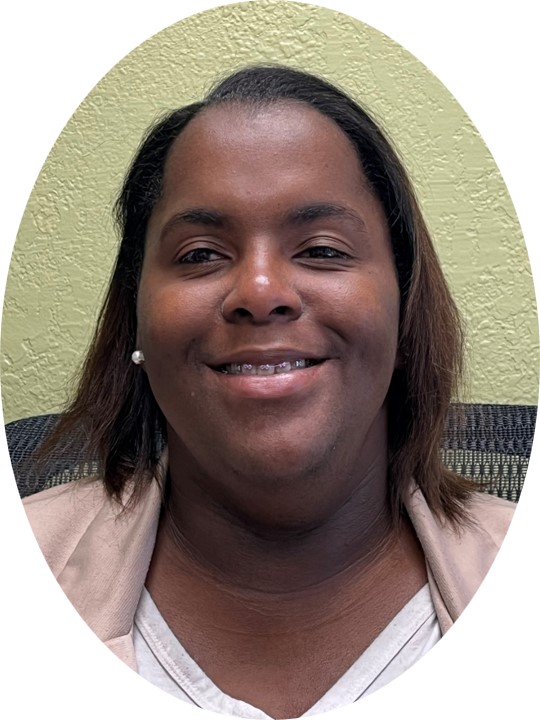
PCCS CLIENT SUCCESS STORY: MARY JANELLE
BY RUTH COWAN
Sep 2024 – Vol. 1, No. 2
Nothing is more fulfilling than hearing an inspirational story, especially about someone achieving their dreams. My heart is always warmed when I hear about someone who perseveres and finds success. Mary – JaNelle Nichols inspired me in just this way.
Nichols learned the value of perseverance and determination from her parents, who were both hard workers. Her father, a custodian, and her mother, an office manager and teacher at a middle school, instilled a strong work ethic in her. Their commitment to their careers was a model for her own, and she carried that same level of commitment into pursuing her career goals.
Holding a Bachelor of Arts in Human Development from California State University, East Bay, and an Associate of Arts in Early Childhood Education, Nichols was well on her way to achieving her career goals. As a Pacific Coast Community Services (PCCS) client receiving support with employment services, her determination continued as she applied for over 100 jobs. Her frustration grew as she shared that she had participated in 30 interviews without a job offer.
Listening to her, I could hear the discouragement and frustration as she shared that she did not get a response after the interviews. As someone with no vision, her career choice left potential employers concerned that she could not fulfill the position’s duties. Nichols suspected potential employers considered her a liability due to her disability.
At this point, Nichols was losing hope when she was invited to interview for the After- School Program Leader position at Ashland Village with Eden Housing. As with previous interviews, she was not expecting a positive outcome. When she received a call for a second interview, she shared that she asked them if they had the right person. As a woman who grew up in after-school programs, she had a unique experience that went along with her education.
For once, they looked past her visual impairment and saw what an asset she would be to the program. They offered her the job. I can only imagine how pleased she must have felt. Finally, all her hard work and determination paid off. The program leaders saw her for the amazing person she is and the value she brings to the children who attend the program.
Because of my own visual impairment, I am well aware of Nichols’s struggles in her job search. We, as people with disabilities, know what we are capable of. We bring with us a rare determination and commitment. Having potential employers see our capabilities is where the issue lies.
I am in awe of Mary-JaNelle Nichols. She is the perfect example of the determination and hard work ethic her parents instilled in her. Her success is a beacon of hope for those with disabilities searching for employment. ■
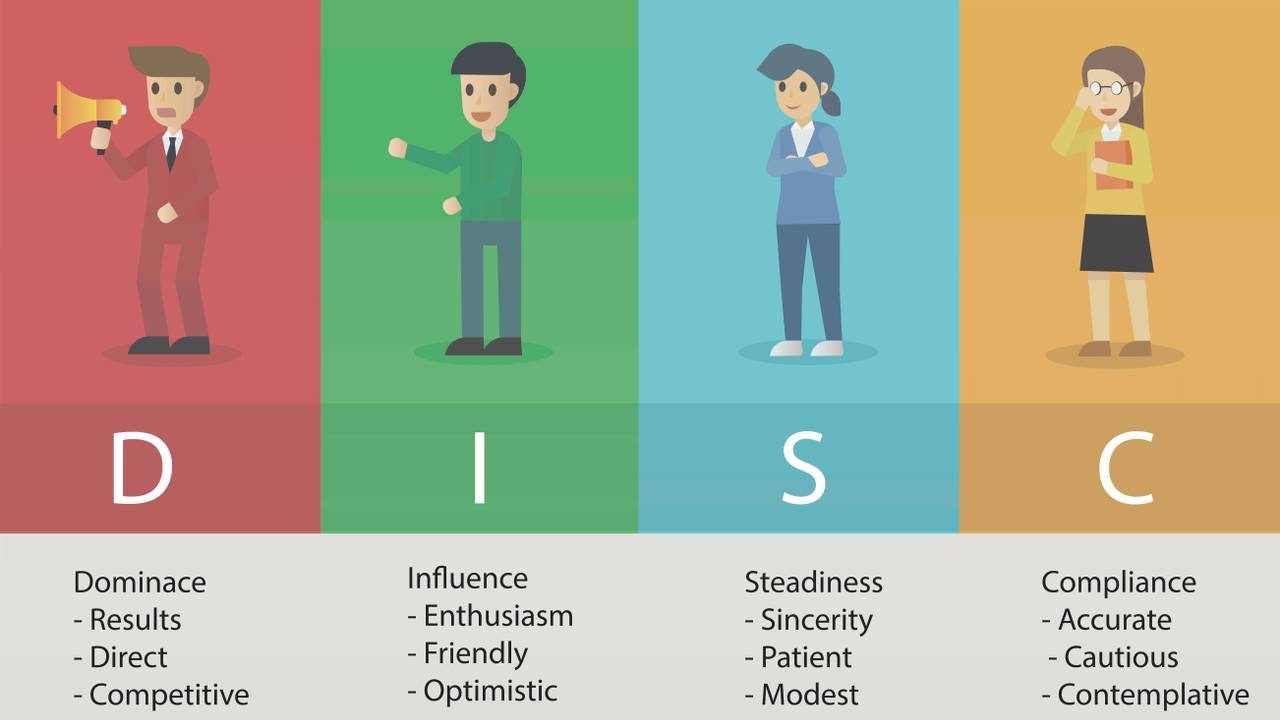
UNDERSTANDING YOURSELF AND OTHERS
IN JOB SEARCH AND CAREER DEVELOPMENT
BY OTTO DELEON
Sep 2024 – Vol. 1, No. 2
Navigating the job market can be daunting. For individuals with disabilities, veterans, and those re-entering the workforce, the challenges can be particularly formidable. At PCCS, we understand that finding the right job isn’t just about matching skills and experience with job descriptions. It’s also about understanding oneself and how to interact effectively with others in the workplace. Drawing upon extensive research in personality, cognitive and developmental psychology, psychometrics, sociology, behavioral science and other leading fields, PCCS incorporates DiSC personality assessments into our portfolio of client services.
So, what is DiSC? It’s a powerful tool that categorizes behavior into four primary personality types: Dominance, Influence, Steadiness, and Conscientiousness. Each type has its own unique strengths, limitations, and areas for improvement. By understanding these personality types, individuals can gain insights into their own social and intellectual proclivities as well as those of others.
For our clients, the DiSC assessment serves multiple purposes. Firstly, it provides valuable self-awareness. Understanding whether one naturally gravitates towards leadership roles (Dominance), thrives on social interactions (Influence), prefers steady and predictable environments (Steadiness), or excels in analytical tasks (Conscientiousness) can be eye-opening. This self-knowledge can guide clients in their job search, helping them to target roles that align with their natural strengths.
For example, a client with a high Conscientiousness score may find fulfillment in roles that require attention to detail and systematic work, such as accounting or data analysis. Conversely, a client with a high Influence score might excel in positions that involve teamwork and communication, such as sales or customer service.
Understanding one’s own personality type is only part of the equation. The DiSC assessment also helps clients understand how to interact with people who have different personality types. This is crucial for building effective working relationships and fostering a positive work environment.
For instance, a client with a Dominance personality may need to learn to be patient and understanding when working with someone who scores high in Steadiness and prefers a more methodical and cautious approach. Similarly, an individual with an Influence personality might need to focus on being more detail-oriented when collaborating with someone who has a Conscientiousness personality.
Personality assessments are also beneficial for individuals who are engaged in professional networking, either for job search purposes or career development. The insights gained from the assessment tools can be leveraged to interact more effectively and authentically with recruiters, hiring managers, business owners, community leaders, and perfect strangers. For those engaged in active job hunts, effective networking has the potential to open channels to work opportunities that haven’t or never officially get posted on a job board.
Personality assessments are also valuable for those looking to grow professionally. Understanding one’s own strengths and how to leverage them can be a key factor in securing promotions. Additionally, being able to adapt one’s communication and working style to different colleagues and supervisors can enhance workplace relationships and open doors to new opportunities.
At PCCS, we provide our clients with the tools they need to succeed, not only by helping them find jobs but also by equipping them with the knowledge to thrive in their chosen career paths. The DiSC assessment is a cornerstone of this approach, fostering self-awareness, enhancing interpersonal skills, and ultimately contributing to a more open and supportive workplace environment.
The journey to employment and career advancement is deeply personal and varies from one individual to another. By incorporating DiSC personality assessments into our services, PCCS is committed to providing tailored support that recognizes the unique social and intellectual proclivities of each client. We believe that understanding oneself and others is a critical step towards achieving professional success and building a fulfilling career.
For more information about PCCS services, please visit our website at www.pccsonline.org. Together, we can unlock potential and create opportunities for everyone. ■
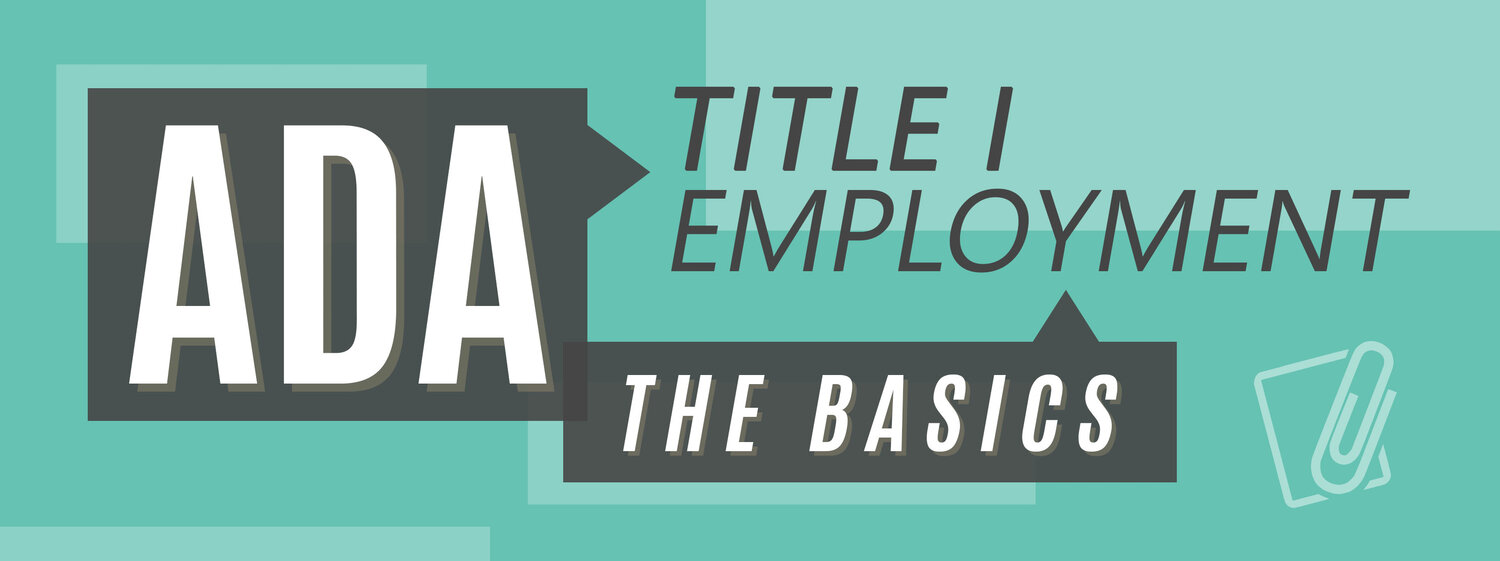
ADA TITLE I: YOUR RIGHTS AND RESPONSIBILITIES
BY RUTH COWAN
Sep 2024 – Vol. 1, No. 2
Having a disability can present challenges, especially when looking for employment or carrying out one’s job duties if currently employed. This article focuses on understanding Title I of the ADA and the laws and regulations that support individuals with disabilities who are seeking employment or are currently employed.
Until 1990, there were no real protections for those with disabilities. Fortunately, the ADA was signed into law, ensuring that individuals with disabilities have the same constitutional rights as those without disabilities. Title I of the ADA was created to ensure that those with disabilities had fair and equal access to employment.
Title I “prohibits private employers, state and local governments, employment agencies, and labor unions from discriminating against qualified individuals with disabilities in job application procedures, hiring, firing, advancement, compensation, job training, and other terms, conditions, and privileges of employment,” as specified on the ADA website. What does this mean for someone with a disability, and what do employers need to know about Title I?
Knowing your rights and responsibilities is crucial for both employers and those seeking employment or currently working. It can alleviate frustration, confusion, and compliance issues in the future. Below is a summary to ensure employers and employees are well-informed.
Employers and Recruiters
While many employers know their responsibilities under ADA Title I, there can still be some confusion. One of the biggest myths is that under the ADA, employers may be required to hire someone with a disability who is not qualified for a specific position. This is not the case. According to the Department of Labor, a person with a disability cannot claim discrimination if they are not qualified. They must be able to perform all the essential functions of the job, with or without accommodation.
While employers are free to hire any qualified applicant, their decision must not consider a person’s disability. When considering applicants, remember that someone with a disability is not receiving privileges or special accommodations. Reasonable accommodation is required. This means that a reasonable accommodation allows them to be equal to their coworkers, not superior.
Employers are often concerned about the cost of accommodations. In many cases, accommodations are free, and those that may cost more can be offset through tax incentives. This includes incentives that cover the cost of making the business accessible.
The Job Accommodation Network (JAN) can be a valuable resource for employers who are unsure of ADA Title I or who want more information. “JAN provides free and confidential consultation for employers of all sizes and types,” according to their website.
Employees and Employment Seekers
Knowing your rights and responsibilities is just as crucial for those currently employed or seeking employment. The ADA Title I is not a guarantee of employment. You still need to be qualified for the position for which you are applying. ADA Title I only guarantees fair treatment and reasonable accommodation to allow you to do the job for which you were hired.
For those looking for employment, it is against the law for a potential employer to ask if you have a disability or require you to take a physical during the application process. However, once you receive a job offer, the employer can ask you to take a physical and inquire if you can complete the essential job duties.
If you are offered the job, “the law allows an employer to condition the job offer on the applicant answering disability-related questions and/or successfully passing a medical exam,” according to the Equal Employment Opportunity Commission (EEOC). You cannot be singled out. The same practice must be applied to all new employees. The job offer may be revoked if you cannot perform the duties even with accommodations.
Once employed, your employer may ask disability-related questions or require a physical only if they pertain to your requested accommodation. The law also states that all medical information must be kept confidential.
You have the right to work free of discrimination, harassment, and retaliation during the application process while working, or as a former employee. Another consideration is that those who are in a relationship with someone with a disability are afforded the same rights pertaining to discrimination, harassment, and retaliation.
If you feel you have been discriminated against based on your disability, you can file a complaint. There are several ways to file a complaint with the EEOC but be aware that there are time restrictions that must be observed. If you need more advice or resources, JAN has great resources that may help.
With my disability, the employment-seeking process has always been stressful. Not knowing whether to disclose my disability or how to approach the accommodation I need with an employer has been overwhelming. Learning my rights set in ADA Title I has been a game changer. I feel more confident about seeking employment and performing my job duties once hired. If you have questions, contact the EEOC or JAN for more information or visit them online. ■
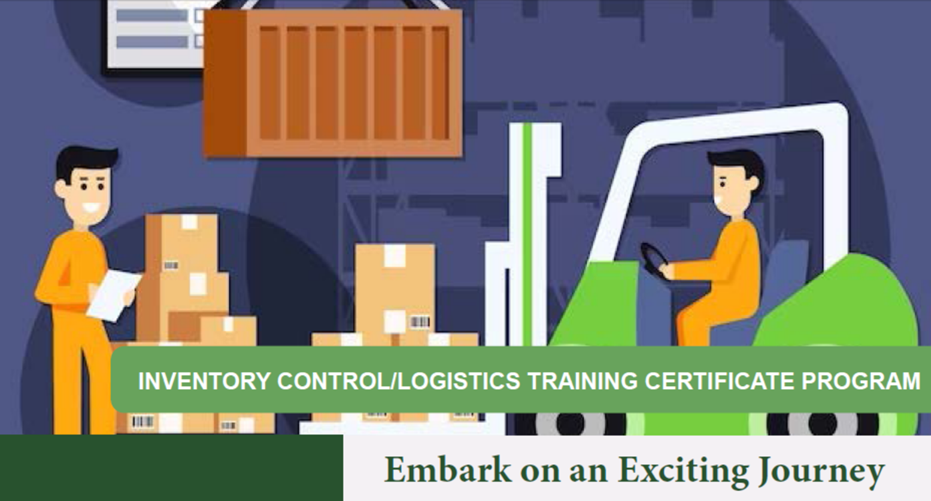
THINKING OUTSIDE THE BOX:
PREPARING FOR A CAREER IN LOGISTICS
BY APRIL WHITE
Sep 2024 – Vol. 1, No. 2
The San Francisco Bay Area, with its prime geographic location and energetic economy, is a bustling hub for logistics—the coordination and tracking of goods and merchandise from origin to destination. Home to the Ports of Oakland, San Francisco, and Benicia, as well as smaller ports scattered throughout the Bay, the area is a key gateway for the movement of merchandise. This environment provides an array of positions and occupations for those seeking work in the supply chain sector. Based in the San Francisco East Bay, PCCS has taken advantage of its location to offer a course that equips its clients with a competitive edge in the field.
The Inventory Control and Logistics Certification Program provides training and preparation essential for employment in inventory control, shipping and receiving, and warehousing. This 32-hour in-person course features a thorough overview of warehouse basics with an emphasis on critical skills. PCCS Instructor Frank Silva described the course focus as “teaching best practices in logistics and warehouse settings…that are transferable from job to job. Each employer will want to orient their new employees to their own systems and culture, but there are skills that are universal.” Safety training is key among such skills, and it is central to the course. As most companies are bound by state and federal safety regulations, completing a course covering workplace safety could be just the ticket to catch an employer’s attention.
When training for jobs that involve the physical coordination and movement of goods, there is no substitute for hands-on experience. This course is designed to provide students with ample opportunity to learn and demonstrate new skills. Students are encouraged to collaborate, role-play, and develop effective communication within warehouse, storeroom, and/or mailroom settings. Key topics covered include freight handling, shipping and receiving, assessing inventory, record keeping, professional confidentiality, ergonomic lifting, and proper body mechanics.
The structured coursework prepares students to be successful as both employment candidates and hired employees by providing optional supportive learning resources such as videos, self-tests, and reference materials throughout the course. The program is tailored to address the individual strengths and challenges of learners, both of which are regarded as opportunities for growth. Class size is small, just a handful of students, allowing participants to learn at their own pace with guidance from a competent and knowledgeable instructor.
This in-depth course is held in a sustainably-resourced simulated warehouse environment at the REAP Climate Center in Alameda. The Climate Center provides a unique off-grid, carbon-neutral learning atmosphere for the course, which includes training in best practices related to ecology-related topics such as recycling, hazardous materials disposal, and waste reduction to prepare learners for an employment landscape where industries and standards are increasingly adopting green practices for long-term sustainability.
Learners receive a certificate upon completion and the opportunity to collaborate with PCCS’s knowledgeable and resourceful job developers to refine their resumes, sharpen their interview skills, and tailor their job search strategies for the ideal position. According to course instructor Alessandro Maione, “There is high demand for workers in logistics inventory – it’s a growing field here [in the Bay Area].” This position is supported by current data from the State of California Employment Development Department, which shows no job shortages in this category. In fact, it ranks among the top five categories for the number of openings for workers without a college degree in Alameda and Contra Costa counties, and it is predicted to maintain its rank through 2030. Bay Area workers in this field have impressive earning potential, grossing an average income that is 18% higher than the national average. With the combination of this comprehensive course and PCCS’s supportive employment services, job seekers gain a serious advantage in an industry that has a rich history, current high demand, and a bright outlook in the Bay Area. ■
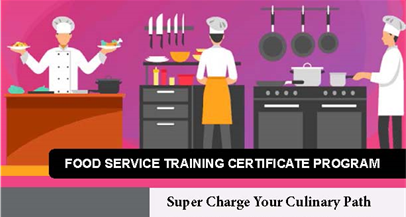
SERVING UP FOOD SAFETY
BY APRIL WHITE
Sep 2024 – Vol. 1, No. 2
Since June of 2011, when California Senate Bill 602 went into effect, the state has required that employees who prepare, serve, or store food in restaurants and dining facilities have valid food safety certification. This regulation intends to mitigate the risk of contamination and help keep diners safe from foodborne illnesses. Employers also benefit, as maintaining compliance improves quality, boosts consumer confidence, and reduces legal liabilities.
ServSafe, a certification program developed by the National Restaurant Association and approved by the state of California, helps workers and employers comply with these regulations. Those who complete the course and pass the ServSafe Food Handler Exam are awarded a certificate that allows them to work as food handlers in California. To meet demand, ServSafe trainings are readily available.
But not all trainings are alike. PCCS has put a unique spin on food safety with their Food Service Training Certificate Program. Most other programs are brief and often conducted entirely online, relying heavily on reading materials, videos, and lectures. Counter to this approach, PCCS offers a 32-hour in-person training program with a strong emphasis on hands-on learning experiences. Students are awarded certification after passing the ServSafe Food Handler Exam, but the course offers much more. In addition to covering the basics of food handling, the PCCS program delves into kitchen prep work, sanitation, food preparation and presentation, and essential skills like the safe use, care, and disinfection of cutting tools and surfaces.
According to a study from Purdue University, students who participated in hands-on activities—also known as active learning—received significantly higher test scores than those who didn’t. Another study (conducted in 2013 by scholars from the Universities of Washington and Maine) found that learners who engaged in active learning were 1.5 times more likely to succeed in coursework than their peers who did not. While the PCCS program includes conventional resources like a coursebook and video learning, it really shines by highlighting interactive instruction and encouraging participation, discussion, and teamwork. So far, the course has maintained a 100% success rate—all students who have completed the training have also passed the final exam.
Another unique benefit of the training is the guidance of instructor Alessandro Maione. With extensive experience in commercial kitchen operations and the hospitality industry, he is an invaluable resource. As an excellent teacher passionate about safety, he clearly explains concepts and engages with learners. In this in person setting, he’s available to demonstrate techniques, answer questions, and act as a mentor during training. Students in this multifaceted course gain practical experience in serving food and working with the public in a commercial food service capacity. These hands-on opportunities help build ‘muscle memory’ that allows learners to become more efficient and consistent while reducing the cognitive load of their tasks. They also have the unique chance to practice their skills in an off-grid, carbon-neutral commercial kitchen at the REAP Climate Center.
Designed to be accessible to all learners and tailored to meet students’ needs, this course prepares participants for more than just fast food jobs. The small class size, person-centered learning format, and instructor mentoring support students to learn at their own pace and prepare for employment in various restaurant and kitchen settings. By focusing on personalized learning and real-world readiness, the PCCS Food Service Training Certificate Program provides a solid foundation for a successful and fulfilling career in the culinary and hospitality industries. ■
Premiere Issue
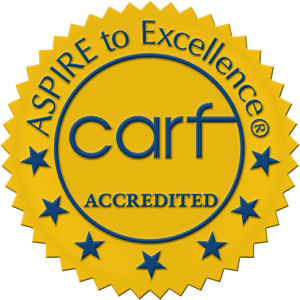
Pacific Coast Community Services Earns CARF Accreditation!
BY RUTH COWAN
Jan/Feb/Mar 2024 – Vol. 1, No. 1
Pacific Coast Community Services (PCCS) strives to provide people with disabilities and veterans with the best possible services. For more than 25 years, PCCS has shown its commitment to its clients through the programs and services it provides. In 2023, this dedication resulted in PCCS receiving the CARF (Commission on Accreditation of Rehabilitation Facilities) three-year accreditation.
“CARF accreditation is a review to determine if programs/services meet defined international standards of quality in health and human services,” according to the CARF International website. CARF accreditation testifies to the quality of services an organization provides. The three-year accreditation is the highest accreditation an agency can receive. In August 2023, PCCS received this distinction.
PCCS President and CEO Christopher Flynn and COO Lawrence Silva stated that the CARF accreditation review not only provided insight to PCCS on how to maintain the quality of its programs and services, but also on how to improve its systems and service delivery and the experience of staff and clients.
The accreditation process is no easy feat. It is more than just filling out an application. Several steps must be taken prior to the survey accreditation team assessing an organization from top to bottom. Keeping in line with CARF’s mission, the CARF survey accreditation team is comprised of industry peers who understand program services and organizational management. The survey is conducted to determine conformance with all standards. The survey accreditation team speaks with staff, clients, employers, and the State of California Department of Rehabilitation counselors to ensure PCCS provides quality services, reports data in a timely manner, and meets clients’ needs.
The CARF accreditation is important to PCCS. It not only confirms that PCCS is meeting the needs of its clients but that it continues to do so. Each year, PCCS submits an annual conformance report to ensure they continue to meet CARF standards. This gives clients, vendors, and other organizations confidence in PCCS’s services.
PCCS is a growing organization that is expanding its services into southern California and Nevada in 2024. Both senior executives, Flynn and Silva, are excited about being able to serve clients in other geographic areas. By utilizing the recommendations from the CARF survey accreditation team, PCCS can maintain the highest standards when rolling out its new programs and services. ■

Message from the Chief Operating Officer: Lawrence Silva
Jan/Feb/Mar 2024 – Vol. 1, No. 1
As Pacific Coast Community Services (PCCS) continues to develop strong workforce programs and services that benefit its participants, I am proud to be a part of the leadership team and work closely with staff members who are invested in our mission. Over the past three years, I have witnessed participants transition from our training programs into new careers and can vouch that job seekers have gained employment with the support of our solid employment team. Our partnerships with other organizations, such as HireAble, REAP Climate Center, Elegance of Berkeley, the Senior Community Service Employment Program (SCSEP), and the Native American Health Center, strengthen our workforce development services and programs while creating more opportunities for our participants.
In 2024, I am excited to expand upon these relationships with our partner organizations. This year will bring new programming and services within the nature-based systems at the REAP Climate Center. The REAP Climate Center is doing incredible work with developing nature-based solutions to climate change and food/water insecurities. PCCS has relocated our food service and inventory control/logistics training to the REAP Climate Center, creating a state-of-the-art, hands-on training center with industry-standard facilities and equipment. The curricula are being developed for additional training programs in nature-based systems. PCCS will also be the workforce partner of the Native American Health Center for internships at the REAP Climate Center and is now providing training in food service and inventory control/logistics for the San Leandro Unified School District.
PCCS continues to manage and develop work experience and internship placements in the Bay Area. We receive referrals from the California Department of Rehabilitation to link clients with art and music programs that we bring to senior living facilities, as well as our clerical support and administrative work experience. Working with Senior Community Service Employment Program (SCSEP) of Oakland, PCCS successfully placed 13 senior job seekers in paid employment last year and acts as a host agency.
The outlook for PCCS is bright. Our organization received an outstanding review from the Commission on Accreditation of Rehabilitation Facilities (CARF) in October 2023. We were awarded a three-year CARF accreditation. We plan to maintain this high level of compliance as we grow and serve more participants in the future. I look forward to being a part of PCCS as we build on our success and continue to provide opportunities for our participants. ■

PCCS Client Success Story: Laurie Van Allen
BY RUTH COWAN
Jan/Feb/Mar 2024 – Vol. 1, No. 1
Today is a new day—another day of hope that my job hunt will prove fruitful. I scroll through job listings. I check my email to see if there is a response from one of the positions I have applied for, but there is nothing. The feeling of defeat begins to set in, and I begin to wonder if I will ever find employment. That is, until I am introduced to a woman who had once been in my same situation, Laurie Van Allen.
Laurie Van Allen was born with Retinitis Pigmentosa, and, like me, has been visually impaired since birth. Over the years, Van Allen’s sight has gradually gotten worse; she currently has only a small amount of vision in her right eye. She also currently works full-time with the Social Security Administration. Although it wasn’t easy for her to find this position, her determination and positive outlook led to her success.
At 16, Van Allen left her home in southern California to attend a school for the blind in the San Francisco Bay Area. Her independence was evident then when she decided not to return home after school. Instead, she chose to remain in the Bay Area.
Over the years, Van Allen has worked at many places, but her work always centered around helping others. Whether training to support those with brain injuries, or volunteering as a rape crisis counselor, Van Allen’s dedication to others was present.
In 2022, Van Allen redirected her career goals, and became a client of Pacific Coast Community Services (PCCS). As with many people searching for a job, she became frustrated with the process. That is, until PCCS Chief Operating Officer Lawrence Silva suggested she apply to the IRS and Social Security Administration for their call center opportunities.
Van Allen now works for the Social Security Administration and loves her job. She states that she works alongside great people. She also says that her coworkers understand her needs as a person with visual impairment because they are also visually impaired, and this has made her training process a pleasant experience.
I am glad I had the opportunity to speak with Laurie Van Allen. Her positivity and uplifting demeanor were inspiring to me. Her determination and ultimate success gave me the hope I need to continue with my own job search. ■


Navigating Job Search: New Year, New Strategies
BY OTTO DELEON
Jan/Feb/Mar 2024 – Vol. 1, No. 1
Jumping into 2024, we’re confronted with the reality that the job market constantly changes, bringing new challenges and opportunities. Understanding and adapting to job market changes can help direct your job search and improve your chances of finding meaningful work. Here, we explore key strategies to find a job.
Virtual Spaces – Challenge: The virtual job search can be overwhelming, with numerous platforms and a vast array of information. Opportunity: To stand out, build a robust digital presence. Launch or update a LinkedIn profile, join online professional groups, and participate in virtual networking events. These steps can increase your visibility to potential employers from the comfort of home.
Digital Literacy – Challenge: Computers and electronic gadgets are all around. Interfacing with and using them are part of most people’s daily activity. In the job market, more and more roles require computer skills and an ability to use digital communications, online applications, and electronic devices. Opportunity: Consider enrolling in courses and workshops to sharpen your electronic technology skills. Acquiring new computer and digital skills can help you stand out from other candidates and make your resume more attractive to potential employers, especially in a technology-driven job market. You might even discover you enjoy this work. Fields like digital marketing, online research, and programming are highly sought after.
Global Competition – Challenge: Growth of remote work, advances in technology, and other shifts in doing business continue to force changes in the job market, meaning that the talent pool has gone global. Opportunity: Approach any competitive job market with a strong personal brand. Highlight what makes you stand out and identify strengths that demonstrate an ability to work beyond where you live. This may include language skills, projects you have worked on, experience with national or global issues, and special teams you have led. These attributes can set you apart in any job market.
Remote and Hybrid Roles – Challenge: Employers seem to want workers back in traditional in-person work settings. Employees seem to want to work remotely or in a hybrid capacity. Opportunity: When applying for remote or hybrid roles, emphasize self-management skills, ability to work independently, and previous experience and success in remote settings, if applicable. Demonstrate your understanding of remote work tools, practices, and proven methods.
For those looking for work in 2024, remember that adaptability and flexibility are essential. Equipped with these valuable assets, job seekers are poised to turn challenges into opportunities and increase the chances of finding meaningful work in the new year. ■
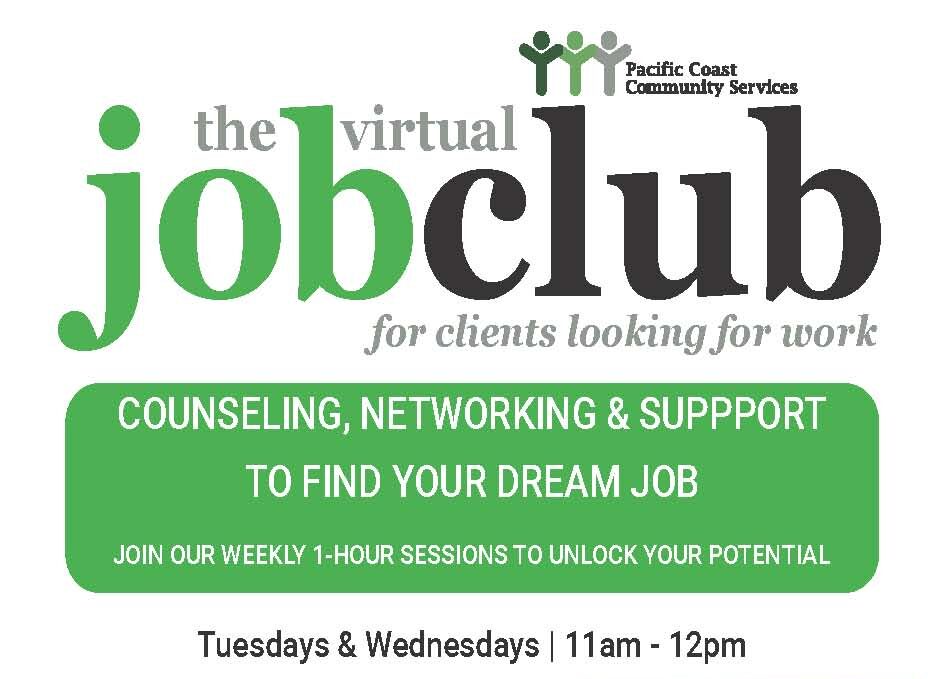
Additional Help
BY OTTO DELEON
Jan/Feb/Mar 2024 – Vol. 1, No. 1
PCCS provides employment services to individuals with disabilities and other barriers to employment. Clients are referred to PCCS by the Department of Rehabilitation. PCCS eligible clients are invited to weekly Job Club meetings for group coaching and support. The Job Club meets twice weekly and offers resources like resume-building workshops, mock interviews, and career counseling. Resources are tailored to help job seekers with their unique circumstances. ■
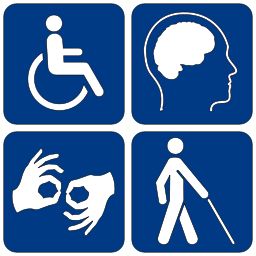
Americans with Disabilities Act – Part 1: An Overview
BY RUTH COWAN
Jan/Feb/Mar 2024 – Vol. 1, No. 1
People with disabilities often face predicaments daily. A person with low vision may not be able to read bus numbers, or a person in a wheelchair may not have ramp access to a public building. At one point, people with disabilities found themselves forced to navigate these situations with little help. Luckily, with the enactment of the Americans with Disabilities Act (ADA), that era is over.
While many know about the ADA, they may not truly understand all it offers. So, what exactly is the ADA? In a nutshell, the ADA addresses the accessibility needs of those with a disability in the United States. Beginning in 1990, the ADA began as a way of combatting discrimination, but since then it has expanded into helping people with disabilities gain access to public spaces and workplace accommodations.
I am visually impaired and honestly didn’t understand the positive impact the ADA could have on my life until I went to school and was able to take untimed tests and have access to large print. I thought the ADA’s main benefit was preventing discrimination. I saw it more as a protection for those in wheelchairs.
Over the next several newsletters I will go over each of the five titles within the ADA. I will explore the ADA as a disabled person and provide insight into how the ADA protects people with disabilities in many areas of public life. I will give a better understanding of what is considered a disability, and I will discuss how the ADA ensures people with disabilities have the same benefits and rights as those without a disability. ■
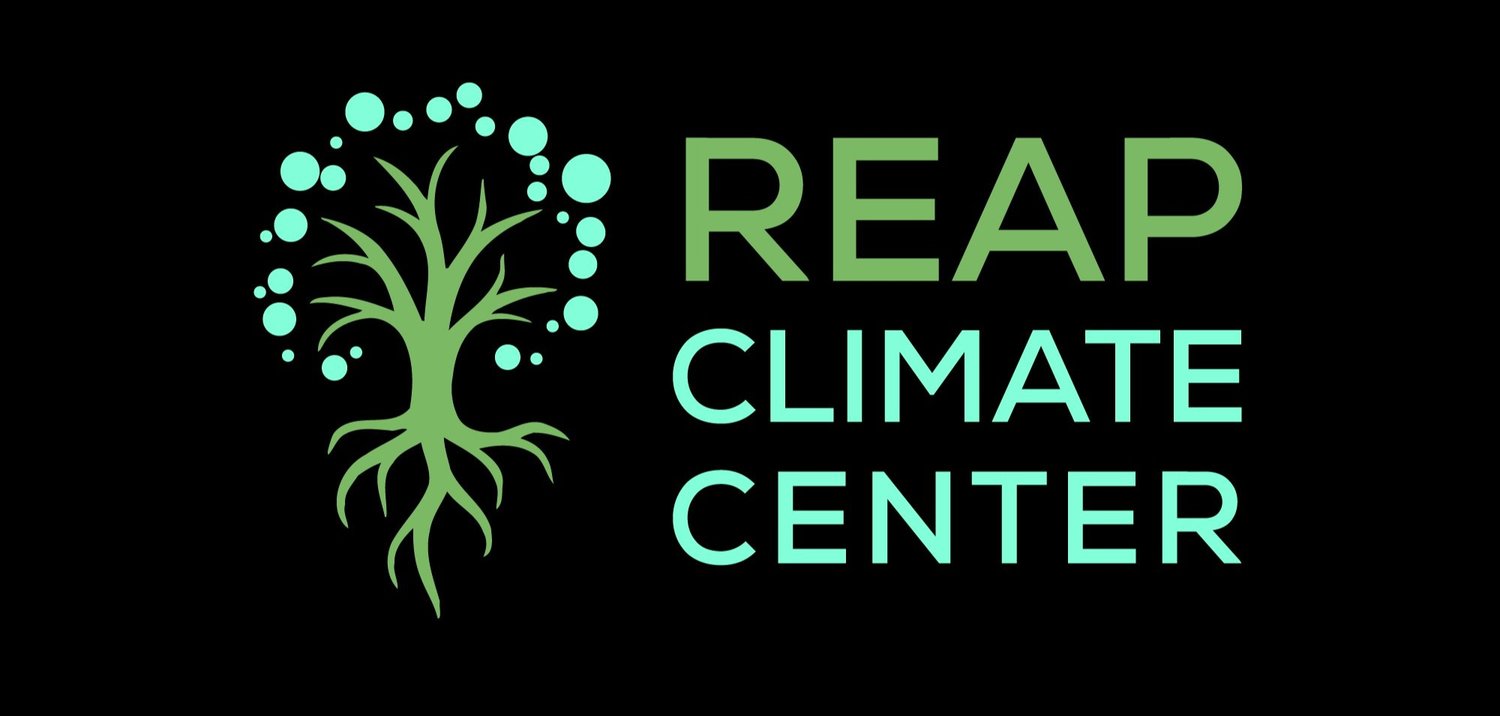
PCCS Forms New Partnership with REAP Climate Center
BY RUTH COWAN
Jan/Feb/Mar 2024 – Vol. 1, No. 1
Pacific Coast Community Services (PCCS) clients have different career goals. Some want to work in an office, others would love to work with their hands. Because of this, PCCS offers different training programs. The latest of these, its partnership with REAP Climate Center (REAP), is designed to open the doors for clients who want to work in nature-based systems and find jobs that will continously improve the environment.
REAP Climate Center is a non-profit organization that believes in the power of regenerative systems. Jonathan DeLong, REAP Climate Center’s Director, has stated that their mission is to support scalable, nature-based solutions to mitigate climate change. REAP does this while also promoting the health and resilience of our planet’s ecosystems.
The partnership between PCCS and REAP is a natural one. Lawrence Silva, Chief Operating Officer of PCCS, shares Jonathan DeLong’s passion for regenerative systems and building employment opportunities within this field. Silva explained about the programs already in place through the partnership: inventory control/logistics and food service certification programs. REAP is also developing curricula for additional classes and programs, including regenerative systems, habitat restoration, urban farming, and agriculture.
What excites Silva about this partnership is the knowledge clients will receive through training and working at the REAP Climate Center. The programs PCCS offers at REAP will provide clients with certification and hands-on experience that can be transferred easily into the workplace.
“The future partnership between PCCS and REAP is bright,” Silva stated, “because our clients benefit from a regenerative viewpoint, which is a growing movement in communities and corporations to make a difference in climate change. By working together, both organizations can accomplish their goals in social justice, workforce development, and nature-based processes.” ■
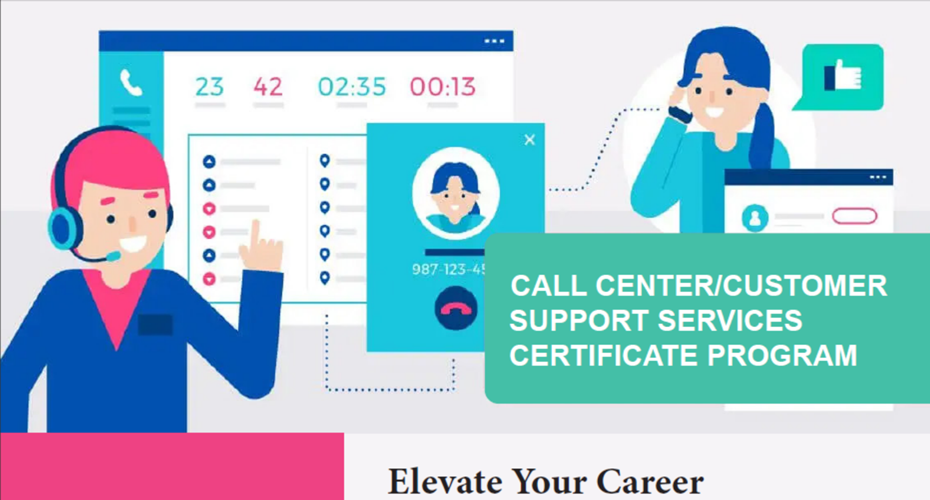
PCCS Call Center/Telephone Services Training Certificate Program
BY RUTH COWAN
Jan/Feb/Mar 2024 – Vol. 1, No. 1
Pacific Coast Community Services (PCCS) prides itself on the training it offers its clients. The PCCS Call Center/Telephone Services Training course has been reinvented recently to emphasize a fun and interactive approach to learning while providing instruction on industry-standard skills and practices.
Instructor Frank Silva is a retired school principal who wants to make a difference in the lives of others. Silva has upgraded the curriculum and training methods of the course, utilizing his 35 years in education and his creativity to design modules that not only teach, but entertain PCCS clients. Silva’s course provides clients with everything they need to know to enter the call center/telephone services workforce: the vocabulary, technological systems, and interpersonal skills used in the customer service industry.
Silva shared that while effective communication is critical when dealing with customers in call centers and telephone services, the skills learned in this course can be applied to other careers. Some of the most important soft skills in any profession are communication and understanding personalities.
Silva helps his students to understand different personalities in this course by administering the DiSC (Dominance, Influence, Steadiness, and Conscientiousness) assessment. The DiSC assessment results tell students about their own behavioral style and about the different behavioral styles. Students learn how to communicate and work with each personality type.
Silva is excited about teaching the Call Center/Telephone Services Training course. The labor market for employment in call centers and telephone services is strong. Graduates of the program look forward to becoming gainfully employed with government work or in the private sector. ■
